I have now been in my new job for three months, although it feels much longer. I wouldn't presume to call myself an expert in antiquarian books, but it's amazing how much you can learn in a few weeks and I can now confidently throw certain titles into the skip without needing to check their value.
I know that almost every gardening book published after 1900 is worthless. I also know that titles written by Arthur Mee, J.B.Priestly, Mazo de la Roche, Hugh Walpole, Frances Parkinson Keyes and Alec Waugh are two a penny.
But even after I've removed all of the middlebrow 1930s novels, book club editions, reprints of the Pilgrim's Progess, sets of encyclopaedias and Reader's Digest publications, I'm still left with thousands of books. To confuse things further, I often find things that aren't books.
Yesterday I found a superb 1928 catalogue from a department store specialising in gentlemen's clothes. I'd never heard of
Welch, Margetson & Co, but apparently they were one of the leading companies of their kind, with eight banches in Great Britain, six in Australia and one each in Ireland, New Zealand and Canada, plus agents in every continent.
The London branch had four floors, with whole departments for items like sock suspenders and umbrella handles. Here is a small selection of their wares:
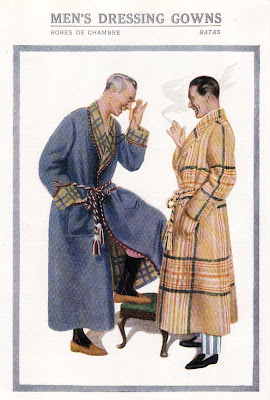
Before they became associated with old age and hospices, these dressing gowns were the height of sophistication.

I'm quite fond of the yellow one, whilst my son prefers the Tom Bakeresque one in the upper middle.
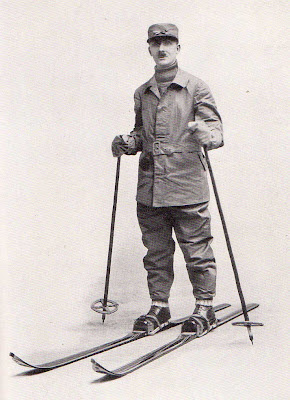
Try to ignore the 'Hitler on Ice' associations. After the bushy moustaches of the Edwardian era, these 'taches were the epitome of style. Hitler's popularity in post-Weimar Germany had nothing to do with his policies. People just loved his cool moustache.
The Hitler moustache's popularity obviously waned somewhat after the Second World War (as did the name Adolf) and only the ghastly egotists General de Gaulle and Franco continued to wear them.
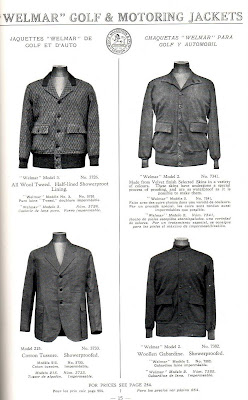
What superb jackets! Stylish, well-cut and clearly good quality. I would pay good money to own any of them.
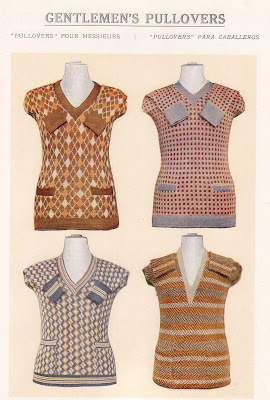
It's strange how contemporary these designs look; to me, at least. I wasn't expecting to find such high quality colour illustrations in a catalogue from 81 years ago. I suppose that
Welch, Margetson & Co could afford it, as their clientelle weren't hard up.
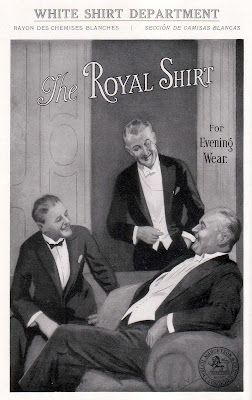
I want to be one of these men, exchanging jovial banter over a postprandial glass of port whilst my chaufferer sits outside, rubbing his hands to keep warm. Actually, in reality I wouldn't be able to enjoy myself knowing that some poor bugger was freezing to death on my account. It's a flaw in my pretensions to be a gentleman.

Ah, the sheer decadence of having to deliberate over the design and colour of a pair of slippers. How grim our sweatshop-made, utilitarian clothes look by comparison.
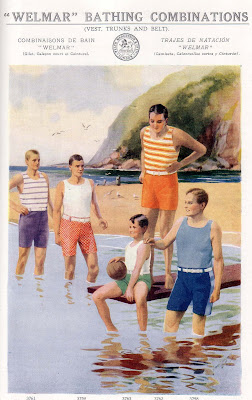
The bathing suit is a pleasing alternative to the pot-bellied, tattooed, nipple-pierced British tourist in the Costa del Sol (and if a certain friend of mine is reading this - no, this isn't an oblique reference to you).
I hope it goes without saying that I haven't forgotten the other side of the 1920s and 30s, as chronicled by Orwell and Steinbeck. Indeed, my family probably never set foot in
Welch, Margetson & Co and if they had, I expect that they would have been ushered out.
My grandfather was an unskilled labourer in the 1920s. He joined the army in the First World War before he'd had a chance to learn a trade and spent the rest of his life living on the breadline.
One day he got a maintenance job with London Transport and had a slightly Chaplinesque accident with a ladder whilst walking through a tunnel. He fell on the electric line and suffered serious burns, but in those days the concept of sick leave was regarded as some mad, Bolshevik plot. He ended up having to take his two weeks' annual leave at Clacton-on-Sea, where his family relaxed on the beach whilst he was treated at the local burns unit.
As I have said before, the recent past was a great time if you were rich, white, male and abled-bodied, but it could be fairly unforgiving to anyone who wasn't.
The likes of
Welch, Margetson & Co were for a certain type of person:

I don't know exactly when they disappeared, but it looks as if a combination of Michael Caine, nylon and sweatshops were the cause of their demise. I wonder what my grandfather would have made of it all?
 Obviously it's some sort of chrysalis - hopefully not of extra-terrestial origin. If my family start treating me with a modicum of respect, then I'll know that this is an 'Invasion of the Body Snatchers' scenario. Otherwise I can only assume that this is about to become a butterfly. This photo fails to do justice to the beautiful gold sheen on the casing.
Obviously it's some sort of chrysalis - hopefully not of extra-terrestial origin. If my family start treating me with a modicum of respect, then I'll know that this is an 'Invasion of the Body Snatchers' scenario. Otherwise I can only assume that this is about to become a butterfly. This photo fails to do justice to the beautiful gold sheen on the casing.




 Heaven in a wild flower.
Heaven in a wild flower.
























